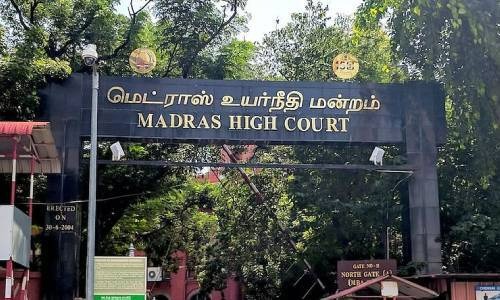
Case Title: The Assistant Commissioner of Customs v. S Ganesan
The Madras High Court recently noted that the phrase "at any previous stage" used in the provision would refer to the stage from when the Magistrate takes cognizance of the case when discussing the court's authority to release an accused under Section 245(2) of the CrPC.
The court then overturned the Judicial Magistrate, Special Court Customs' order of discharge after noting that the magistrate had granted the discharge petition at the "check and call on" stage.
In the current case, the respondent/first accused, who was running a security firm licenced by the Airports Authority of India, colluded with others and committed the offences listed in Sections 132 and 135 of the 1962 Customs Act by assisting his employees in smuggling gold bars hidden inside mobile phones out of the customs border. A Private Complaint was submitted to the Special Court for Customs based on this. The adjournment of the private complaint was noted as "check and call on". The accused requested the dismissal of the case, which was granted, even before the complaint was filed or given a number.
The accused/respondent argued in his petition that, about the violation of Section 132 of the Customs Act, the Appellate Authority had already ruled that, insofar as the allegations against Accused No. 1, he is not an importer and there was no omission or commission on the part of the accused/respondent in making a false declaration, and he cannot be punished for such a false declaration or evasion of duty. As a result, the fine imposed as per Section 114(AA) of the Customs Act is not justifiable. The corresponding provision for the imposition of a fine for the violation of Section 135(1)(b) comprising carrying, removing, concealing, or dealing with the goods is Section 112. (b). The appellant authority had ruled that the accused/appellant cannot sustain the penalty under Section 112(b) and had directed that the penalty be imposed per Section 112 (a).
Therefore, he argued that the alleged offences had already been adjudicated on the merits by the Appellate Authority and were now final. The revision petitioner argued that because the magistrate had not yet taken cognizance of the case, the plea to drop the charges was premature. The accused does not have any say during the pre-cognizance phase. The circular was binding on the petitioner and was not usable by the respondent as far as that was concerned. Additionally, the Appellate Authority's ruling was not based on facts that would have bound the court. To determine whether the "at any previous stage of the case" phrase would cover the "check and call" stage of the complaint, where the Magistrate has not even taken cognizance of the complaint, was the main issue before the court.
Further, the court relied on the case of Ajoy Kumar Ghose v. State of Jharkhand decided by the Hon’ble Supreme Court in which it was held that,
‘'The previous stage would be before the evidence of the prosecution under Section 244(1) CrPC is completed or any stage prior to that. Such stages would be under Section 200 CrPC to Section 204 CrPC. Under Section 200, after taking cognizance, the Magistrate examines the complainant or such other witnesses, who are present. Such examination of the complainant and his witnesses is not necessary, where the complaint has been made by a public servant in discharge of his official duties or where a court has made the complaint or further if the Magistrate makes over the case for inquiry or trial to another Magistrate under Section 192 CrPC. Under Section 201 CrPC, if the Magistrate is not competent to take the cognizance of the case, he would return the complaint for presentation to the proper court or direct the complainant to a proper court.’'
The court noted that, in this case, upon presentation of the complaint, without taking any authoritative notice, the matter was simply adjourned to another day with the endorsement “check and call on”. Neither the complaint is numbered, nor the sworn statement is recorded. This is the stage, in which the form of the complaint is being looked into before taking notice of any kind of allegations in the complaint.
The court concluded that because the stage of Section 200 CrPC had not started, an application for discharge was not possible at that time. The complainant was therefore free to submit a discharge application once the Magistrate had taken cognizance of the offence, and the court ordered the Magistrate to handle the complaint per the law.

